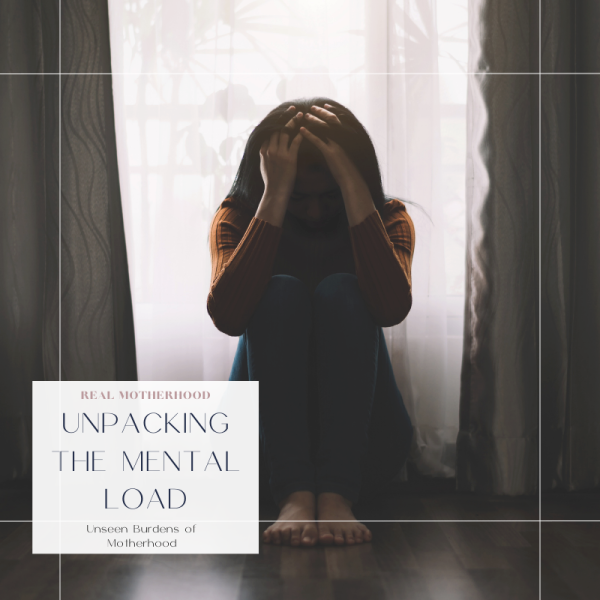After you’ve finally put the kids to bed, what is the next thing you do at the end of the long day? Whether you’re relaxing and scrolling, or finishing up chores, you’re also carrying the mental load of motherhood with you. It’s like an invisible backpack filled with a never-ending to-do list that keeps your family’s world spinning. It’s with you 24/7 and it’s taking a toll on you, Mama!
This is the stuff nobody warns you about when you become a mom, and today, we’re unpacking the mental load and shedding some light on these burdens we carry with us. Let’s dive in and keep it real because every mom needs to know she’s not alone in carrying these unseen burdens.
UNRAVELING THE MENTAL LOAD
Ah, the invisible workload – the mental load of motherhood that sneaks up on us like a stealthy ninja! It’s that constant buzzing in our minds, reminding us of everything we need to do, plan, and organize for our families. It’s about ensuring everything runs smoothly for the family’s benefit, but this effort often goes unnoticed and isn’t considered part of the regular workload.
According to a recent comprehensive literature review, mental labor in the context of unpaid home and childcare tasks involves the thinking and planning work you do to manage things like household chores and family needs.
Let’s say it’s time to make the annual well-check appointments with the kids’ pediatrician. If you are responsible for this task, it’s not as easy as calling the office and booking an appointment. Some of the planning and preparation involved in this task includes (but is not limited to):
- Filling out the pre-appointment paperwork
- Preparing your kids for the inevitable pokes and prodding
- Getting kids dressed in easy-to-undress outfits
- Shuffling everyone in and out of the car, packing the diaper bag, snacks, and water bottles
- Entertaining the kids in the waiting room
- Keeping the kids calm during the appointment
- Remembering all of your concerns and questions when you’re actually in the room with the doctor
- Picking up prescriptions
- Handling copays
- Communicating with your partner about the appointment
- Sending in updated physicals to school
One task in motherhood is never just one task.
THE GENDER GAP OF THE MENTAL LOAD
The gender gap in the distribution of the mental load is an unsettling reality and well-documented. As with all data, there are certainly outliers and other factors at play; however, studies consistently reveal that moms bear the brunt of unpaid domestic and childcare responsibilities compared to their male partners.
In my household, I noticed this gap firsthand shortly after joining the motherhood club. Despite having a supportive and willing partner, the mental load of managing our family’s affairs automatically fell on my shoulders, even when I worked full-time out of the home.
I kept track of feedings, contacted daycares, set up tours, stocked the diaper bag, changed the clothes to the next size up, planned family outings and parties, shopped for and prepared meals, and so on. Now that I’m a SAHM, the list has quadrupled, along with my anxiety and feelings of overwhelm, failure, and resentment.
My husband does his fair share of communal tasks– I haven’t had to think about changing the oil in my car, a burnt-out lightbulb, or the filter on the furnace for twelve years, and I am beyond grateful for his ability to take on these tasks. When you look at it this way, it seems like there is an equal distribution of household tasks, not to mention that he is the sole provider for our family now. I could argue (and I will) that his tasks are pretty straightforward. There’s a problem and a solution.
As illustrated above, the tasks I commonly take on involve anticipating needs, coordinating schedules, keeping records, regulating emotions, multiple steps, preparation, and mental gymnastics. This scenario echoes a broader societal trend where women, by default, assume the primary role of coordinating and managing the ins and outs of family life.
JOIN THE AUTHENTIC MOTHERHOOD MOVEMENT
Start your journey to authentic motherhood with our FREE Authentic Motherhood Blueprint. You’ll get practical tips, reflection exercises, and actionable steps to embrace authenticity, take value-aligned action, and foster genuine connections.
understanding the unequal distribution
According to the literature, the imbalance is not due to a lack of willingness or men being unable to do these tasks. It’s about societal expectations influencing who takes on the mental load, perpetuated by the idea that specific tasks (especially those related to family organization) belong primarily to women.
There’s this pressure for women to be the planners, the multi-taskers, and the ultimate jugglers of schedules and obligations. Consequently, women tend to carry the mental load, making decisions, planning, and coordinating various aspects of family life, often without even realizing the extent of the burden they’re carrying.
Understanding this inequality is crucial. It’s not about blaming our partners or assigning fault. It’s important to note and understand how our ingrained societal norms disproportionately affect women. Acknowledging this imbalance is the first step toward achieving a more equitable distribution of household mental load.
THE IMPACT OF THE MENTAL LOAD
The toll of this invisible burden hits hard on our well-being, Mamas, often leading to emotional distress, relationship strains, life dissatisfaction, and even career setbacks. Let’s break some of this down and see if you recognize any of these symptoms from carrying the mental load.
The Emotional toll
Emotionally, it’s like riding a twisty rollercoaster, with our emotions closely tied to forces beyond our control. Juggling everything can leave us overwhelmed, anxious, and sometimes drowning in guilt when things slip, or plans go haywire. I think of it as constant mental chatter, like the never-ending hum of white noise in the background of our lives.
The physical toll
It’s not just a mental game—it takes a physical toll too. The stress and mental fatigue from bearing the mental load can show up as headaches, fatigue, dysregulated sleep, and even a weakened immune system. Mama, you’re making yourself sick trying to do it all! (Peep my post on Healthy Boundaries for tips on how to start saying “no” and giving yourself a much-deserved break!)
The relationship toll
Here’s the kicker—it doesn’t just stop at us. It casts a shadow on our relationships, too. Family dynamics can get tenuous, partnerships might feel strained, tension levels rise, and there’s this weird sense of isolation like no one else truly gets the epic juggling act happening behind the scenes. The lack of a simple acknowledgment or pat on the back adds more weight to our overflowing mental load backpack. We are left helpless in our quest to create a more balanced, sustainable family life.
Strategies for Reducing the Mental Load
Most articles and experts agree on the following five gems of wisdom as a great starting point to balance the mental load in parenting:
- Open the Communication Floodgates: Break the ice and start talking about the mental load. Share your feelings, concerns, and the million tabs open in your brain. Have an open dialogue with your partner about the invisible tasks that often go unnoticed. For instance, spill the beans about how a single doctor’s appointment can feel like a week-long mission impossible.
- Create a Command Center (Shared Calendars and Lists): Establish a shared space for schedules and tasks. A centralized hub keeps everyone on the same page, whether it’s a physical whiteboard in the kitchen or a shared app. Use a shared calendar to mark school events, playdates, and deadlines. It can be a game-changer when everyone can see and contribute to the master plan.
- Delegate Like a Boss: Break down responsibilities and assign tasks. Recognize each other’s strengths and interests. I’ve turned over grocery shopping to my husband because he’s faster and more efficient, and I really didn’t enjoy it. Delegating tasks based on expertise eases the mental load and allows each person to contribute their unique skills. This also goes back to establishing boundaries – check out this post for more on delegating and letting go of control.
- Weekly Check-Ins: Schedule regular check-ins to discuss upcoming events, tasks, and potential challenges. This isn’t a heavy-duty meeting; it’s more like a cozy chat over coffee. Share updates on what’s on the horizon and divide upcoming responsibilities. For instance, imagine having a Sunday evening ritual where you both sit down, discuss the week ahead, and plan accordingly. It’s a proactive way to tackle things together. Word of advice: Bedtime is usually not the best time for these little chats. They usually last longer than anticipated, often bringing up big feelings or reactions. It’s best to save that for a time when you’re both more alert and in the right headspace to listen and contribute.
- Celebrate Small Wins: Acknowledge and appreciate each other’s efforts. It’s like a mental load victory dance. If your partner takes the initiative to handle bath time or surprise you with a planned outing, give them some praise. Recognizing and celebrating small wins creates a positive feedback loop, motivating both of you to keep the mental load-sharing momentum going.
Putting these strategies into action is like creating a tag team against the mental load. It’s not about perfection but finding a rhythm that works for both of you. So, Mama, rally your partner, pick one or two strategies to start and give yourself (and your partner) some grace. Remember, in most cases, these roles are ingrained in us from birth, and it takes time to make meaningful changes.
TLDR…..
Though invisible to most, the burden of the mental load is a shared experience among mothers. It impacts our emotional well-being, physical health, and our relationships. The gender gap in its distribution is a very real consequence of stereotypical societal norms. We can reclaim the balance by communicating, making the household tasks visible, playing to our strengths, delegating when it’s too much or beyond our capabilities, checking in regularly, and celebrating with genuine appreciation and recognition when things go well.
Remember, you’re not alone in this journey. Addressing the unseen burdens is a shared effort toward a more equitable and healthier family dynamic.
Sources:
Reich-Stiebert, Natalia et al. “Gendered Mental Labor: A Systematic Literature Review on the Cognitive Dimension of Unpaid Work Within the Household and Childcare.” Sex roles vol. 88,11-12 (2023): 475-494. doi:10.1007/s11199-023-01362-0





